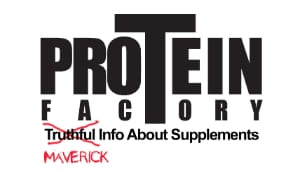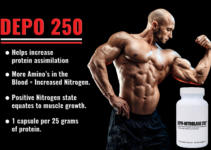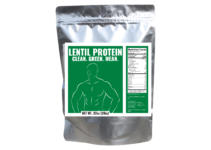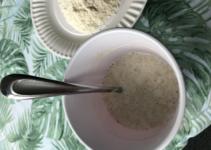This blog post will give you the Protein Spiking List of supplement companies that used ingredients notorious for protein spiking.
Read on…
“Just when you thought it couldn’t get worse, it can, and it will.”
That’s the opening line from Brad Pitt’s movie, Fury. And I’m using that now in the opening of this report to let you know the current state of the supplement industry, in particular, protein powder. You see protein powder is the KING of dietary supplements. If you took all the supplements sold today, the main bulk of them would be protein powders. More people buy protein powder than any other dietary supplement. Walk into any vitamin store and you’ll see rows and rows of protein powders. Unfortunately, many of them are not what they seem. As a matter of fact, they are down right garbage and a complete rip-off. Hidden behind fancy labels and hyped up marketing claims and inside those plastic containers is powder that is NOT protein. If you have been using these powders, which most likely you have been, you’ve been not getting the protein grams that you thought you were getting according to the nutrition/supplement facts panel on the label.
My claim above is bold and shocking and some of you might be saying, “he’s blowing smoke up my butt to sell me his powder” and that, “I trust my company that I buy protein powder from”.
Well, I ask you to keep reading and keep an open mind because what I am about to say is that the protein supplement industry has been pulling one of the biggest scams in the history of protein, and now it is time to expose these frauds for what they are.
It all starts with the owner, CEO, or president of a supplement company. This person decides that he is going to create a protein powder to sell. He knows that protein powder sells like crazy, and he wants a piece of the pie. So to make his new protein supplement he Google’s “supplement manufacturer.”
If you do this, you’ll see from a Google search that three companies have PAID Google to advertise their business for what I just Googled “supplement manufacturer.” So this person that wants his own protein supplement calls one of these companies and asks them for a price quote for whey protein 2lbs in chocolate for example. He tells them he wants it to taste great. The supplement manufacturer calls him back with a price quote, tells him that it’ll taste like a milk shake, minimum order, and tells him to send the label. Approximately eight weeks later the supplement manufacturer ships this guy his protein supplement, and he’s ready to sell. Keep in mind that the guy that wants his own protein supplement knows nothing about FDA regulations and is never told anything about them from the manufacturer.
All good right? Wrong. You see pre-2010 the supplement manufacturing business was like the Wild West. Any Joe Schmoe could do what I said above and make a protein powder with their name on. Some people call this private labeling. Without ANY testing whatsoever ANYONE with money can have their very own protein supplement. That was a problem, big problem. And the FDA knew this was a problem. And let me make one thing clear to everyone. The FDA is not bad. Many people get down on the FDA. I like the FDA; they have helped my company out a lot. They are not bad people, the only people that do not like the FDA are companies that are not following the regulations, don’t want to spend the money and resources to be regulatory compliant and are worried about getting CAUGHT by the FDA.
So before 2010, anyone can make a protein supplement without doing any testing and not have to worry about the FDA recalling their protein supplement. And guess who also knew this, the company actually making the protein supplement, the manufacturer. And this is where the scam begins. The scam called “protein spiking”.
Protein Spiking was exposed about one year ago. I’m not sure who and don’t care, maybe it was a disgruntled employee from some manufacturer, but protein spiking is the biggest epidemic to hit the supplement industry. That is why I’ve put together a protein spiking list.
Protein Spiking is when non-protein ingredient (s) is added to protein powder to fool the protein test and to fool you, the consumer.
“Protein spiking is the practice of adding some non-protein substance to a protein powder to increase the overall nitrogen content of the powder. Proteins are the only nutrients that provide nitrogen (carb and fat do not) (Gene Bruno Natural Product Insider, Vol 4, No 10, April 2014)
Protein spiking ingredients that are commonly added to protein powders are the amino acid glycine, taurine, arginine (and all the derivatives) and the supplement creatine.
A company does this to increase their profit margin by adding cheaper ingredients while fooling the lab test for protein.
Tim Ziegenfuss, CEO of the Center for Applied Health Sciences as saying “Arginine has approximately three times more nitrogen than whey protein, and creatine has approximately one and a half times more nitrogen at less than half the price. Spiking protein with these nutraceuticals is a cheap way to drive up the nitrogen level of a protein powder without adding more high-quality protein.”
Do the math people; that equates to a lot of money.
Protein Spiking List
Some people took it upon themselves to test some brands of protein. See this link
https://docs.google.com/spreadsheet/ccc?key=0Ag9uT-E4EIL7dFZPZnR0WVZybGtFWnRKNzdKNm9XOVE#gid=0
If you have been using any of these brands and were not seeing the gains, you would expect it is easy to explain. When you thought you were getting 25 grams of protein, you might have been only getting 15 or 10 grams.
So now that I have shown you the ugly side of protein spiking, how it is rampant in the industry, how you’ve been getting ripped off for years possibly wasting hundred of dollars on spiked protein, let me now answer some questions and make some statements that all of these so-called supplement experts cannot.
You see I am a real protein supplement expert, thus qualified to put together a protein spiking list. When it comes to manufacturing protein powder, I’m an expert. I’ve been manufacturing protein powders for over 17 years and have been involved in everything from creating products from scratch to finished product testing. Also I am well versed in the FDA code of federal regulations, 111’s for dietary supplements. This is what sets me and my company apart from practically all other supplement companies. All the other supplement companies have no clue about manufacturing and formulating. To make a product they call guys like me and ask for help because they don’t know a thing about where to get ingredients, where to have them made, and how to make them taste good. They only know what kind of design they want for their label. Also and this is the scary part, they have no idea about following the FDA regulations for manufacturing, holding, and distributing dietary supplements. And this is bad…for you at least. It’s only bad for them when the FDA comes to their headquarters for an inspection. And an FDA inspection is not guaranteed. If the company isn’t registered with the FDA, the inspection might never come.
So over 17 years I have been manufacturing protein supplements. Because of my companies vast knowledge of the FDA 111’s for manufacturing them it has given me the knowledge to answer the question of who, what, how, and why did protein spiking ever happen. And most important, how can you avoid spiked protein and get real 100% genuine grade a protein powder. I have put together a top 10 list of the rules to make sure you don’t get a spiked protein and read a little further down for the protein spiking list.
The top 10 rules on how to buy a protein powder that is not protein spiked and is good quality.
1. Look for glycine, taurine, arginine, and creatine on the label. These are the ingredients that companies use to spike protein powders like whey protein and beef protein. If you see any of these on the label DO NOT BUY IT. It’s spiked.
2. Do a Google search for “protein spiking”. You’ll find many companies are involved in protein spiking class action lawsuits. I have included a bunch at the end of the book. Here is a protein spiking list of companies that are involved in class action lawsuits that allegedly spiked their protein powders
i. Body Fortress
ii. ProSupps
iii. Inner Amour
iv. CVS
v. Giant Sports
vi. Musclepharm
vii. Designer Protein
5. Do not buy protein powders that have ZERO grams listed in the supplement facts panel. Bogus companies will label their protein powders as supplements but really do not have any idea about the FDA regulations 111’s. I see this as a major smoking gun to tell you that a company sells a low quality product. You see ZERO grams of ANYTHING are not allowed inside the supplement facts panel. For example, you cannot list ZERO carbs in the supplement facts panel. You are only allowed to list nutrients that are in measurable amounts.
6. Look for amino acids like Leucine, valine, and other added amino acids on the label. Whey protein is expensive because it does NOT come from China. However amino acids, like BCAA’s, which are made in China is cheaper than whey protein. So companies will add amino acids to their protein powders as spiking agents. Don’t be fooled by “We added our BCAA matrix”. This is bull dinky, they added Chinese made amino acids to cut their costs.
7. Look for that use the FDA logo on their product. The FDA logo is NOT allowed on any supplement and the FDA will NEVER allow this.
Finally, the question remains, and it’s a big one…
Who are the dirty scoundrels intentionally spiking protein powder? Is it the CEO of the company who wants his protein powder or is it the supplement manufacturer.
Let me digress for one second to make something clear. Ninety-nine percent of the protein powders that you can buy on the retail shelf or internet today are NOT made by companies that have their manufacturing facilities. Optimum Nutrition, owned by Glanbia Nutritionals is one of the only companies that I know that MAKE the protein, package it, and have it ready for the retail sale. Davisco foods is another one; they sell a product called Bipro. Most protein powders are “private label”.
Back to my above question. Who is the dirty scoundrel that is responsible for protein spiking and getting on my protein spiking list? Is it the supplement company private label guy or is it the supplement manufacturer? Or are they in cahoots together?
First, let’s look at the supplement manufacturers. In this country, there are a bunch of companies that manufacture supplements. If you go to their websites, you’ll see they all say they are GMP compliant (good manufacturing practices) and a slew of other so-called guarantee to market to their potential customers that they make a good product. However this does not mean Bo Diddley and here is why.
Reason #1. They lie
The FDA does not approve or certify any factory. Nor do they approve any dietary supplement made for retail. The FDA simply enforces their regulation 111’s. Some supplement manufacturers, however, like to lie in their marketing and say they are FDA approved facilities.
So what does this tell you about this company? That they are liars? I think so. The FDA does not approve any manufacturing facility.
Reason #2. They fail to follow the regulations.
If you manufacturer a whey protein isolate, this is considered by the FDA a dietary supplement, therefore it must be labeled as such. Any supplement manufacturer must have master manufacturing records (MMR) and batch production records (BPR). This tells you EXACTLY what was added to the powder, by whom, and how much. Look at what this supplement manufacturer says on their website.
“All custom formulas are proprietary and remain property of…..”
http://www.newhorizonnutraceuticals.com/formulation_library.html
Now anyone that puts his or her’s companies name and address on the protein supplement must follow the FDA 111’s. And this means that you must be supplied with the MMR and the BPR. This company MUST supply you with the formulas. If this is YOUR protein supplement, with YOUR companies name on it, the FDA regulations say that you MUST have in your possession the MMR’ and the BPR’s. Thus, how can this company refuse to supply them to the companies that they are making protein powder for? Oh I know call it food and label it with a nutrition facts panel so you can avoid the 111’s and rip people off. Testing we don’t have to test! “F” the quality testing!!!
#3 They not only make the supplement, but they market it as well. Here is a lawsuit against NBTY which makes Body Fortress Whey Protein. They allegedly spike their protein and people are suing them seeking damages. Well NBTY manufactures Body Fortress Whey Protein. Now this is a perfect example of a company knowingly added in the protein spiking ingredients into their whey protein. Someone at this company made the decision to add protein spiking ingredients into this formula. And their label and their website clearly list them on the label as well.
Sometimes there is scamming done on both parts of the protein powder, one by the actual manufacturer and another by the company selling the protein.
I think I have given you plenty of examples to show you that Brad Pitt was right. “Just when you thought it cant get worse it does”.
Not only do you have supplement companies spiking their protein powders but they are made by manufacturing facilities that knowingly do this. Sometimes they put the protein spiking ingredients on the label so you can easily avoid the protein and sometimes they don’t even do that, they just add glycine and taurine and don’t ever put it on the label.
It’s a big problem, an epidemic really. You just can’t trust any supplement manufacturers anymore unless you follow my List of 10 things. If not you are risking buying protein that fails to meet label claims.
Be careful out there when buying protein supplements and please make sure you follow my list of 10 rules when buying any protein supplement and thanks for reading my protein spiking list.
Alex Rogers is a supplement manufacturing expert. He has been formulating, consulting, & manufacturing dietary supplements since 1998. Alex invented protein customization in 1998 & was the first company to allow consumers to create their own protein blends. He helped create the first supplement to contain natural follistatin, invented whey protein with egg lecithin, & recently imported the world’s first 100% hydrolyzed whey.






